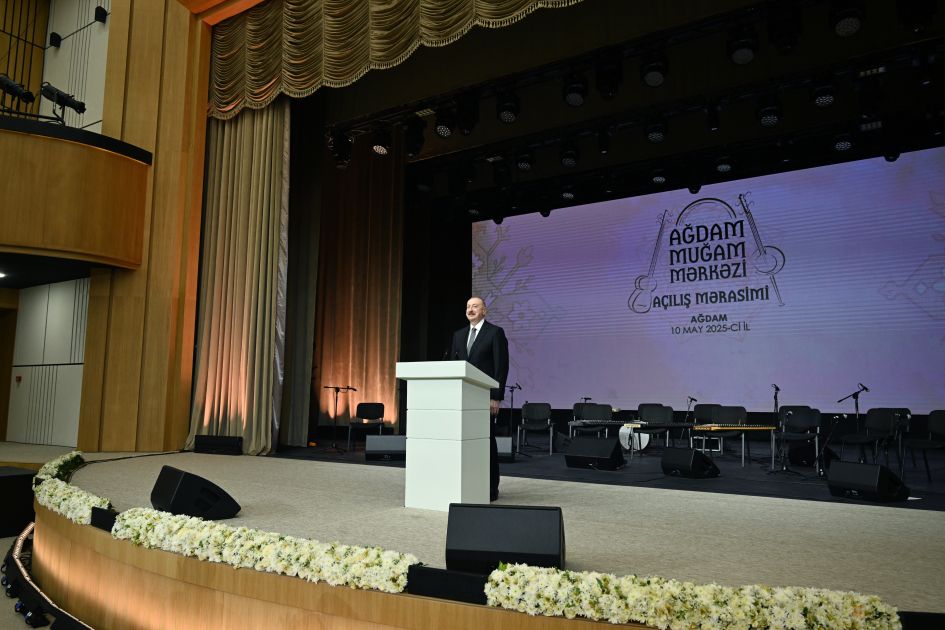Aghdam’s Mugham Center signals new harmony in post-occupation Garabagh

Once known as the “Hiroshima of the Caucasus” due to the devastation inflicted during three decades of Armenian occupation, the city of Aghdam is gradually shedding its scars and reclaiming its soul. The inauguration of the Aghdam Mugham Center on May 10 marks more than the opening of a cultural venue—it stands as a symbol of Azerbaijan’s deeper efforts to breathe life back into a region long silenced by war and erasure.
Held on the birthday of national leader Heydar Aliyev, the ceremony attended by President Ilham Aliyev and First Lady Mehriban Aliyeva served as both a celebration and a statement. It was no coincidence. “The opening of the Mugham Center in the revitalized city of Aghdam is a historic event,” the president declared, calling the moment a meaningful convergence of memory, resilience, and national identity.
But beyond symbolism lies substance. The new Mugham Center is a sophisticated cultural hub with a 507-seat concert hall, cinema, library, dance studios, classrooms, and even an open-air amphitheater. Designed not just as a performance venue but as a center for learning and cultural transmission, it promises to anchor a revival of mugham—the deeply spiritual, improvisational musical genre that UNESCO recognizes as a “Masterpiece of Oral and Intangible Heritage of Humanity.”
In the ruins of Aghdam, where concert halls were replaced by bunkers and homes by trenches, the return of mugham is nothing short of poetic. It is not just culture returning home—it is heritage reasserting its roots. And the location is telling. As Aliyev reminded the audience, this was the very city razed “not during the war, but during the ceasefire,” a quiet but damning indictment of the systematic destruction inflicted during occupation.
Today’s revival of Aghdam, from its railway station to its cultural institutions, reflects a broader vision for post-war Garabagh—one that is not content with mere reconstruction but is intent on reimagining and reintegrating. It is an approach rooted in confidence, but also in contrast to the silence that once hung over the ruins. "Armenian fascism wanted to keep this region under permanent occupation," Aliyev noted, “but they failed to take into account the determination of the Azerbaijani people, the national spirit.”
This determination has manifested not only in political and military victories but in the softer, more enduring victories of the arts. Institutions like the Aghdam Mugham Center are crucial to this process. In this context, mugham is more than music—it is memory, history, and identity. Its return to Aghdam is as much a cultural triumph as it is a symbolic homecoming.
The Heydar Aliyev Foundation, spearheaded by First Lady Mehriban Aliyeva, has been instrumental in ensuring that this tradition is not lost to time. Through national and international initiatives, it has preserved, promoted, and taught mugham to new generations, helping to turn what might have been a relic of the past into a living, evolving art form.
Still, this cultural revival cannot be separated from the political and strategic recalibration now unfolding across the region. As President Aliyev recalled, it took decades of patience, resilience, and “a young generation brought up in the national spirit” to reclaim these lands. And while the visible signs of recovery are impressive, the invisible threads—cultural, spiritual, communal—are what ultimately hold the promise of lasting peace and integration.
The president’s comments about future infrastructure projects, including a potential cable road linking Shusha and Khankendi, speak to a vision where physical and cultural connectivity go hand in hand. “We are also shortening that road,” Aliyev said, “so that it will be possible to get from Khankendi to Shusha in a maximum of 10 minutes.” If realized, such links will not just move people—they will move history.
The opening of the Aghdam Mugham Center is a reminder that in Garabagh, victory is not measured solely in regained territory but in restored identity. It is a melody long suppressed but now rising again—clear, resonant, and distinctly Azerbaijani.
Here we are to serve you with news right now. It does not cost much, but worth your attention.
Choose to support open, independent, quality journalism and subscribe on a monthly basis.
By subscribing to our online newspaper, you can have full digital access to all news, analysis, and much more.
You can also follow AzerNEWS on Twitter @AzerNewsAz or Facebook @AzerNewsNewspaper
Thank you!

